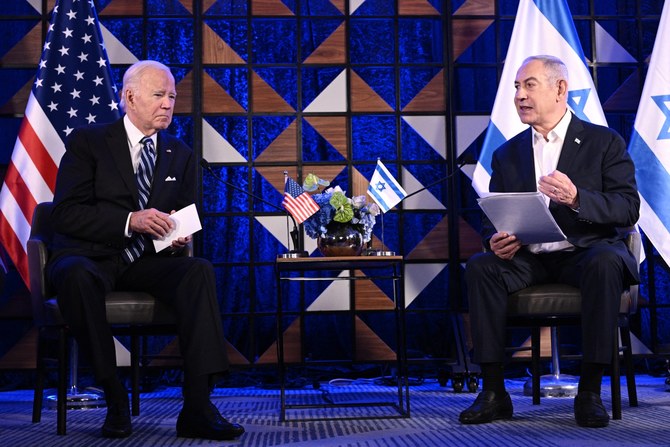Chris Doyle
Among the slew of myths that bedevil the Israeli-Palestinian conflict is that the US-Israel relationship is predicated on Israel being a loyal ally — a reliable partner that has a shared value system.
Israel has been content to receive the US’ billions in funds and also the huge transfers in weaponry, amounting to $310 billion since 1948 when adjusted for inflation. The US also provides intelligence and security assistance and acts as its diplomatic shield, vetoing endless draft resolutions at the UN Security Council. Congress has even voted to sanction International Criminal Court officials. The US has enabled Israel to violate international law at will with no cost. One would have thought this would have rendered the Israeli leadership immensely grateful.
However, Prime Minister Benjamin Netanyahu, in particular, has been a most ungrateful ally. President Joe Biden has plenty of reasons to resent the Israel leader. Back in 2010, when he was vice president, Biden was seething over an Israeli settlement building announcement during his visit, at a time when he was pushing negotiations. Netanyahu also embarrassed the Obama administration when addressing Congress in 2015 on the Iran nuclear deal, directly contradicting and lobbying against the White House. And then there is Gaza.
From October, the Israeli leadership has been obstinate. Biden pushed for improved aid access to Gaza but only received grudging Israeli mini-steps. Biden, rather than challenge this spoiled behavior, indulged it to the extent that the US engaged in the folly of airdrops and wasting $230 million on a pier that has so far delivered just 250 truckloads of assistance. On May 31, Biden presented what he claimed was an Israeli plan for a ceasefire for Gaza. Netanyahu denied paternity. He could not have done more to distance himself from it and to bury all hopes for a ceasefire. Biden cannot even get Netanyahu to outline any strategy for the future of Gaza. The US president’s weakness has been laid embarrassingly bare.
Netanyahu then castigated the US for pausing one single weapons shipment. “I am ready to suffer personal attacks provided that Israel receives from the US the ammunition it needs in the war for its existence,” he said. This was some cheek given the monumental pipeline of bombs the US taxpayer has been forking out for over the last eight months. The White House’s public response was that it was “disappointed, perplexed” — diplomatic code for angered. It canceled a high-level US-Israeli meeting on Iran, the second time this has happened in recent times. Netanyahu will not have broken sweat. Unsurprisingly, Biden’s frustrations boiled over. In an interview, he acknowledged that people have “every reason” to believe that Netanyahu was extending the war on Gaza for his own personal reasons and to stay in power.
Biden is still to learn, after all these years, that Netanyahu is a taker not a giver. To exercise any major influence over his actions, he will have to be far tougher. Biden may want a ceasefire, not least for his own electoral reasons, but he will have to drag Netanyahu kicking and screaming to the negotiating table.
If not, the US can expect Israel to remain a liability. If Netanyahu sees it as being in his interest, he will ignore any advice from his American counterparts.
But the current spats between Netanyahu and Biden are just the tip of the matter. The Israeli leadership frequently and brazenly does not repay the US with support on key American concerns. Take Russia. Israel has hardly uttered a word of criticism of Moscow’s invasion of Ukraine. In fact, Netanyahu has a rich history of summits with Vladimir Putin and has boasted of his excellent relations with the Russian leader.
Israel also has warm ties with China. Only three years ago, Israel opened a Chinese-operated port in Haifa. The US was not happy. This was not the first time Washington had objected to Chinese investment in key Israeli infrastructure. This even happened during the Trump administration, when Secretary of State Mike Pompeo made direct objections to Chinese investments in Israel’s largest desalination plant. Going back to the 1990s, the US was incandescent about Israel selling advanced US stealth technology to the Chinese.
For sure, many nations engage with the US, China and Russia. But Israel is meant to be the US’ primary military and security partner in the region. Washington might expect some support.
US politicians must recalibrate their assessments of the relationship with Israel. It is a one-way deal. It is lazy and simplistic to argue either that Israel controls the US or the other way round. They agree at times, but often there are huge divergences.
But what is clear, at least under Netanyahu, is that the US has little to no influence over Israel’s choices — until such time as when whoever is in the White House is prepared to bare their teeth and change the dynamic. The costs to the US are considerable, with the international reputational harm far more potent than the financial loss.







